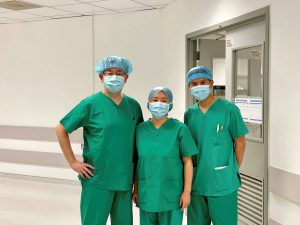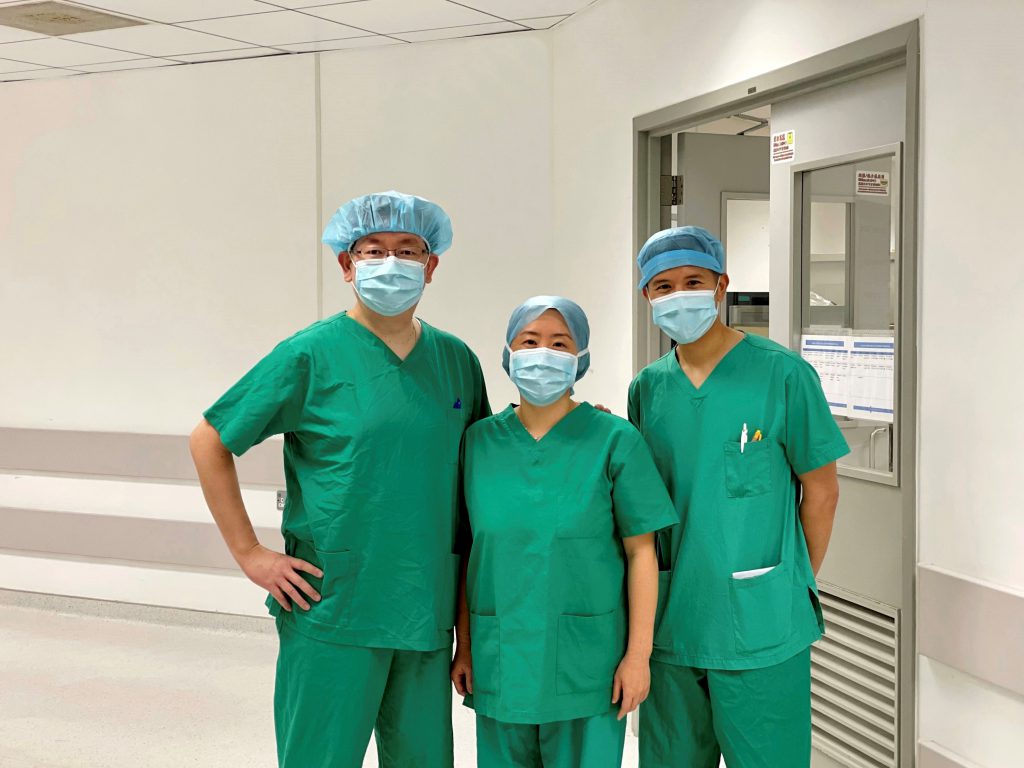CUHK
News Centre
CU Medicine and International Surgeons Suggest Patients with Positive COVID-19 Results Should Delay Surgery for Seven Weeks to Reduce Death Risk
Surgery should be delayed for seven weeks after a patient tests positive for COVID-19 – as operations carried out within six weeks after diagnosis are associated with increased risk of death, according to a new global study. Researchers discovered that patients are more than 2.5 times more likely to die after their operations, if performed within the six weeks window following a positive diagnosis for SARS-CoV-2.
45 doctors from the Department of Surgery and Department of Anaesthesia and Intensive Care at the Faculty of Medicine at The Chinese University of Hong Kong (CU Medicine) and the Hospital Authority in the New Territories East Cluster joined with more than 15,000 surgeons across the world as part of the COVIDSurg Collaborative to determine the optimal duration of planned delay before surgery in patients who have had SARS-CoV-2 infection. This research was led by experts at the University of Birmingham.
One of world’s largest and broadest studies on surgery
The Collaborative collected data from 140,727 patients in 1,674 hospitals across 116 countries in Asia, North and South America, Europe, Africa and Australia – creating one of the world’s largest and broadest studies on surgery. Publishing their findings in Anaesthesia, researchers discovered that patients operated on within 6 weeks after SARS-CoV-2 infection diagnosis were at increased risk of postoperative death, as were patients with ongoing symptoms at the time of surgery.
Dr. Kaori FUTABA, Assistant Professor of the Department of Surgery, CU Medicine explained, “Previous study by the CovidSurg Collaborative showed that half of the patients with perioperative SARS-CoV-2 infection developed pulmonary complications post-operatively, which were associated with high mortality. International guidelines therefore recommend surgery should be delayed for patients testing positive for COVID-19. However, the optimal duration of delay was unknown. This study has shown that surgery should be delayed by 7 weeks, if possible. Potential advantages of this delay must be balanced against the clinical urgency of the individual patient’s condition.”
Professor Simon Siu Man NG, Professor of the Department of Surgery, CU Medicine said, “There are over 11,000 confirmed COVID-19 cases to date in Hong Kong. The majority have been discharged from hospital. Some of these patients may now require elective surgery. We have a patient under our care in Prince of Wales Hospital with rectal cancer, who had COVID-19. This data has allowed us to optimise timing of the surgery in order to minimise COVID-19 related perioperative risks.”
Increased risk of postoperative mortality if patients receive surgery within six weeks after COVID-19 diagnosis
Participating hospitals included all patients undergoing a surgical procedure in October 2020. There were 3,137 patients (2.2%) with SARS-CoV-2 infection and 137,590 (97.8%) patients without. Patients who became infected with SARS-CoV-2 after their surgery were excluded from the study.
|
Time to surgery from SARS-CoV-2 diagnosis |
|
|
0-2 weeks |
1,144 (0.8%) |
|
3-4 weeks |
461 (0.3%) |
|
5-6 weeks |
327 (0.2%) |
|
7 weeks or more |
1,205 (0.9%) |
Statistical modelling was used to adjust for patient, disease, and operation variables and calculate adjusted 30-day mortality rates for different time periods from SARS-CoV-2 diagnosis to surgery. Here are the results:
|
Adjusted 30-day mortality |
|
|
COVID-19 patients operated at 0-2 weeks |
4.0% |
|
COVID-19 patients operated at 3-4 weeks |
4.0% |
|
COVID-19 patients operated at 5-6 weeks |
3.6% |
|
COVID-19 patients operated at 7 weeks or more |
1.5% |
|
Patients who did not have SARS-CoV-2 infection |
1.5% |
The results obtained were consistent across age groups, the differing severity of the patient’s condition, urgency of surgery, and grade of surgery and in sensitivity analyses for elective surgery.
Dr. Albert CHAN, Honorary Clinical Assistant Professor of the Department of Anaesthesia and Intensive Care at CU Medicine said, “On top of the primary finding, we also noticed that patients with ongoing COVID-19 symptoms had an increased mortality rate (6%) even though they had a surgery delayed for at least seven weeks, whereas the risk for patients whose symptoms had been resolved was 2.4% or who had been asymptomatic was 1.3%. We therefore suggest patients with ongoing symptoms opt for further delay.”

45 doctors from CU Medicine and the Hospital Authority in the New Territories East Cluster joined with more than 15,000 surgeons across the world as part of the COVIDSurg Collaborative to determine the optimal duration of planned delay before surgery in patients who have had SARS-CoV-2 infection. They suggested surgery should be delayed for seven weeks after a patient tests positive for COVID-19 in order to reduce death risk. Medical experts from CU Medicine include Professor Simon NG (left) and Dr. Kaori FUTABA (center) from the Department of Surgery and Dr. Albert CHAN from the Department of Anaesthesia and Intensive Care.




